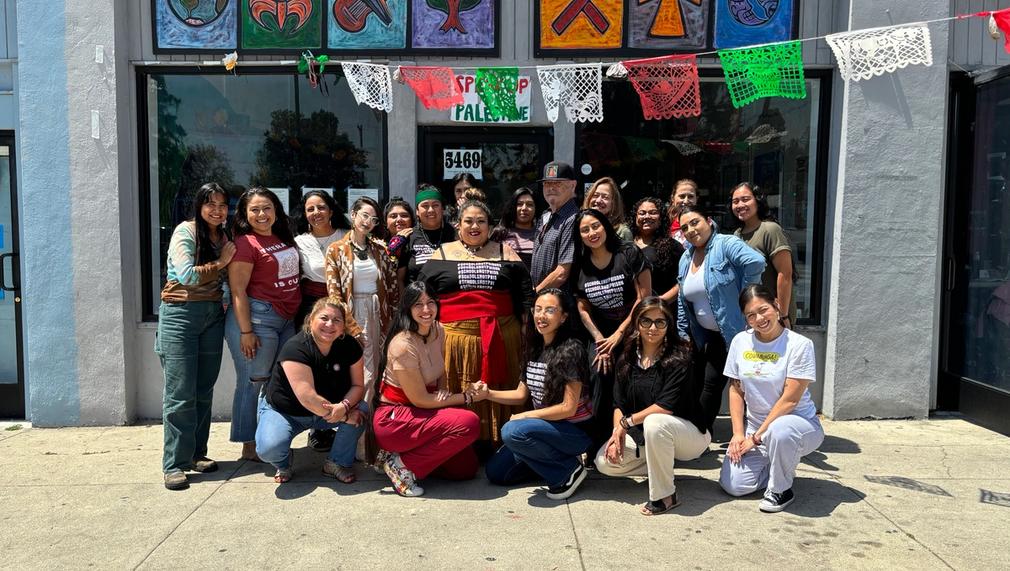SanArte: KLBRI's Healing Youth Circulos
KLBRI’s SanArte program Is an innovative approach to decolonize mental health and community safety in systematically disinvested communities. KLBRI weaves ancestral cultural wisdom, circle keeping, and leadership development with a teen peer mental health first aid certification training into a culturally responsive 12-week youth empowerment experience. KLBRI equips youth and their communities to develop their own ecosystem of care, allowing the community to cocreate spaces and places where Latinx and Indigenous communities can heal and thrive.

What is the primary issue area that your application will impact?
Mental health
In what stage of innovation is this project, program, or initiative?
Pilot or new project, program, or initiative (testing or implementing a new idea)
What is your understanding of the issue that you are seeking to address?
In 2021, almost 60% of female students experienced persistent feelings of sadness or hopelessness and nearly 25% made a suicide plan. Indigenous and Latinx youth have the highest rates of mental health challenges, including suicidality. A 2015 study about girls in the juvenile justice system showed that in California, nearly 81% of girls were sexually or physically abused. Sexual violence increases the likelihood of suicidal ideation, depression, substance use, and PTSD in survivors. Only 7.4% of all youth receive any type of mental health visits or screenings a year. When untreated, mental health disorders worsen and persist into adulthood contributing to secondary challenges like substance use, contact with law enforcement, school dropouts, job loss, and even death. KLBRI aims to address these issues by equipping youth with the skills to recognize and respond to mental health challenges and empower youth to take active roles in their communities’ mental health and wellbeing
Describe the project, program, or initiative this grant will support to address the issue.
KLBRI’s SanArte Youth circulos aims to address the urgent mental health challenges faced by Indigenous and Latinx youth. KLBRI will innovate by taking two existing curricula currently offered and implementing with youth as a prevention and early intervention programs: Xinachtli and Mental Health First Aid (MHFA). The Xinachtli Rites of Passage Curriculum is a gender-responsive, culturally-based rites of passage process designed to promote intergenerational healing, resilience, and leadership. It utilizes expressive arts, popular education, traditional practices and collective care principles to strengthen positive communal relationships, character and youth leadership development. The Teen Mental Health First Aid training equips youth with the skills to identify mental health challenges, provide immediate peer support, and connect peers with appropriate resources. By weaving Xinachtli’s indigenous cosmovision with the evidence-based methods of MHFA into a twelve week circle keeping curriculum, Indigenous and Latinx youth will access safe, sacred spaces and be welcomed into a cosmovision of healing and leadership development grounded in indigenous pathways. This will empower youth to take active roles in their communities’ mental health and wellbeing by organizing and implementing traditional and culturally based healing clinic pop-ups, rooted in ancestral wisdom and holistic mental health and wellness knowledge, promoting long-term well-being and enhancing community safety.
Describe how Los Angeles County will be different if your work is successful.
KLBRI is committed to creating spaces and places where we all can heal and thrive. Exhausted from bearing witness to the lack of access to culturally responsive mental health support services for Latinx and indigenous youth and their communities, KLBRI sprouted in 2021 with its deep-rooted practice on centering healing practices, ancestral and cultural medicine, and collective care. KLBRI’s SanArte programming will transform Los Angeles County enhancing Latinx and Indigenous youths' sense of belonging, identity, and interconnectedness, while catalyzing a lineage of intergenerational organizing power. These outcomes reflect to both youth and communities the power of "la cultura cura" (culture heals). Youth participants will return to serve their communities as peer mental health first aiders and leaders in implementing prevention and stigma-reduction strategies for peers around substance use and community violence.
What evidence do you have that this project, program, or initiative is or will be successful, and how will you define and measure success?
KLBRI's project evaluation outcomes are evidence-based with a community participatory approach, involving a co-creative process of voice and choice for youth and community members. Through check-ins, listening sessions, and consensus building, youths' lived experiences, needs, and wants will be shared, held, and implemented into the decision making of the collective programming. Pre and post evaluation surveys will measure changes in behavior, attitudes, and feelings using indicators like emotional connection, cultural identity, mental health knowledge, interconnectedness, and self-efficacy, along with other community-defined markers. We aim to achieve 80% of participants per year who self-report an increase in their abilities within one of the following domains: integrating teachings in daily life, coping and/or assisting others in coping with mental health challenges, enacting healing and change work in their community, and continuing involvement in the program as peer supports.
Describe the role of collaborating organizations on this project.
KLBRI is fiscally sponsored through the Los Angeles Indigenous Peoples Alliance (LAIPA). KLBRI partners with Xinachtli Comadre National Colectiva to create an intergenerational Working Group to support as an elder/maestra council for the SanArte program and lean on their collective wisdom to mentor youth and facilitators. These two collaborations offer an intergenerational team of indigenous community organizers, elders, gang interventionist, and violence prevention curriculum facilitators that use the methodology of La Cultura Cura to build character development and social and emotional connectedness. LAIPA has facilitated 30 years of grassroots community health organizing.
Approximately how many people will be impacted by this project, program, or initiative?
Direct Impact: 60.0
Indirect Impact: 2,250.0